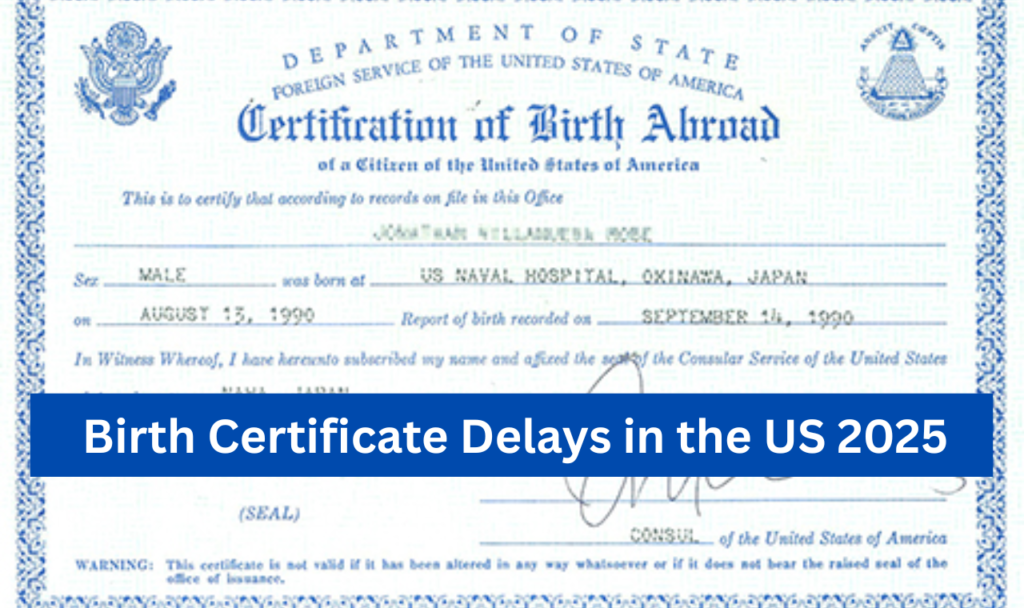In 2025, obtaining a U.S. birth certificate has become more challenging than ever, with processing times lengthening due to administrative backlogs, policy changes, and increased application volumes. These delays impact essential services such as obtaining a passport, enrolling in school, or applying for government benefits.
If you or a family member need a birth certificate, understanding the causes behind these delays and learning how to navigate them can save time and frustration. Here’s what you need to know.
Why Are Birth Certificates Taking Longer to Process?
Several factors contribute to the increasing wait times for birth certificates, including policy changes, administrative inefficiencies, and heightened demand.
1. Policy Changes
In recent years, federal and state agencies have introduced stricter verification measures to combat identity fraud and ensure document authenticity. While these measures improve security, they also slow down the issuance of birth certificates.
For example, some states now require additional supporting documentation or identity verification before issuing a birth certificate. If an applicant’s documents do not meet new standards, the process can be further delayed.
2. Administrative Backlogs and Staff Shortages
Many state and local vital records offices are facing staffing shortages and outdated record-keeping systems, causing backlogs in processing applications. For instance, New York’s Bureau of Vital Statistics has reported delays of up to five years in some cases, leading to significant concerns from genealogists and families needing timely access to records.
3. Increased Demand for Birth Certificates
With birth certificates being a primary document for identity verification, demand has surged in recent years. People need them to apply for passports, obtain REAL IDs, register for government benefits, and even enroll in schools. The increased volume of requests, combined with slower processing times, has overwhelmed many state agencies.

How Long Does It Take to Get a Birth Certificate?
Processing times vary by state and application method. Here’s an overview of the estimated wait times in 2025:
| State | Processing Time |
|---|---|
| California | 7 to 9 weeks |
| New York City | 2 weeks (online); 6-8 weeks (mail-in) |
| Pennsylvania | Around 2 weeks |
| Minnesota | Approximately 4 weeks |
| Texas | 20 to 30 days |
For the most up-to-date processing times, visit the National Center for Health Statistics (NCHS) website: CDC Vital Records.
What These Delays Mean for You
Birth certificate delays can impact many aspects of life, including:
- Travel: If you need a birth certificate for a passport application, delays could affect travel plans. The U.S. State Department requires a certified birth certificate for first-time passport applications. Check travel.state.gov for requirements.
- Government Benefits: Programs like Social Security, Medicaid, and other assistance programs often require a birth certificate. Visit SSA.gov for more details.
- School Enrollment: Many schools require a birth certificate for enrollment, especially for kindergarten and college applications.
How to Avoid Long Wait Times
Here are some proactive steps to help you get your birth certificate faster:
1. Apply Early
If you know you’ll need a birth certificate for travel, school, or any legal process, submit your application well in advance to accommodate potential delays.
2. Ensure Accuracy
Errors in applications can cause additional delays. Double-check all required information, including:
- Correct spelling of names
- Proper documentation
- Accurate date and place of birth
3. Use Expedited Services
Many states offer expedited processing for an additional fee. Some third-party services like VitalChek also provide faster delivery options.
4. Order Online Instead of by Mail
Online applications are typically processed faster than mail-in requests. Visit your state’s vital records office website for online application options. For official state links, visit the CDC’s vital records directory.
5. Follow Up on Your Request
If you don’t receive your birth certificate within the expected timeframe, follow up with the issuing office. Delays can sometimes be due to missing information, and contacting them directly can help speed up the process.
Conclusion
With increasing delays in birth certificate processing, planning ahead is more important than ever. By understanding the causes of these delays and following the steps outlined above, you can avoid unnecessary stress and ensure you get your birth certificate when you need it.
For the most reliable information, always refer to official government sources like the CDC, your state’s vital records office, or the U.S. Department of State.

Pankaj Kumar is a journalist at Chandigarh X, covering admit cards, recruitment, and government schemes. His articles provide readers with detailed insights into application processes, eligibility, and exam updates.
Outside of work, Pankaj enjoys traveling, fitness, and cricket, often participating in local matches on weekends.



